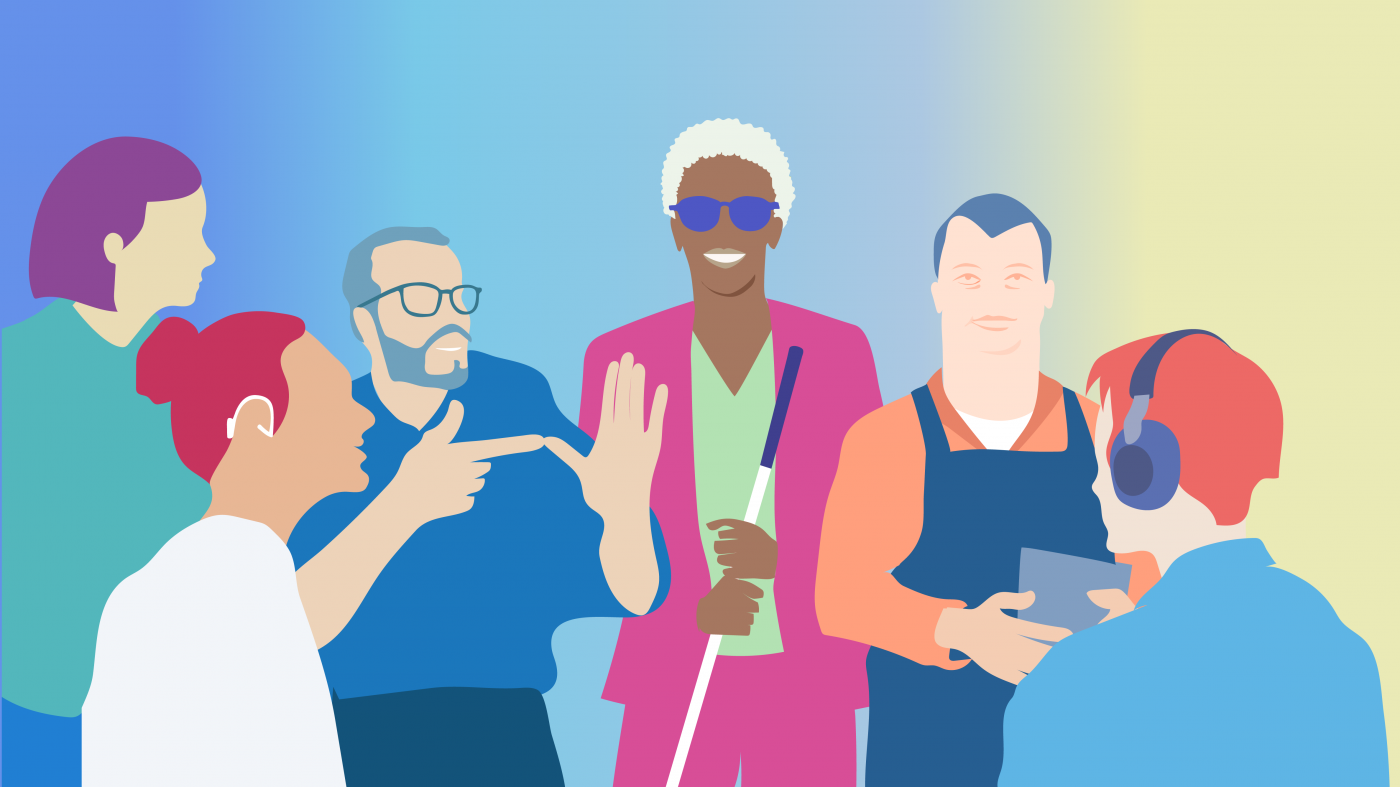
Disability and employment: an ongoing challenge
Despite the progress made in terms ofinclusion, people with disabilities still face numerous obstacles in accessing and remaining in employment.
At European level, only 50.8% of people with disabilities have a job, compared with 75% of people without disabilities (European Strategy 2021-2030).
In Luxembourg, this inequality is confirmed: in December 2023, 64% of employees recognised as disabled had a job, compared with 94.1% of people without disabilities.
In addition, according to the population census carried out in 2021 by STATEC, almost one person in seven in Luxembourg, i.e. around 94,000 people, felt that they were affected by adisability.
While progress has been made, thanks in particular to the mobilisation of certain players, many companies still lack information on theinclusion of people with disabilities.
It is therefore essential to:
The aim is to guaranteeequal opportunities and real, lasting access to employment for the people concerned.
In Luxembourg, mobilisation is growing. The Lëtzebuerg 2021 Diversity & Business Barometer shows that :
“Work and employment” is one of the 8 priorities of the 2019-2024 National Plan on the rights of people with disabilities (document available in the Resources tab).
Because goodwill is not always enough, we have developed resources and practical projects to help employers to:
Resources produced by IMS Luxembourg and the Diversity Charter Lëtzebuerg
IMS has developed a variety of tools to support organisations who want to take action regarding people withdisability. All materials are available here:
A tool to help you measure the place given todisability in your organisation and to increase the maturity of your processes in terms of theinclusion of people with disabilities. With tips, resources and concrete actions ton implement.
Handi-Perception – in 2025, Handi-Diag was enriched with the Handi-Perception tool, which enables you to assess your employees' perception of theinclusion ofdisability in you organisation.
A series of five videos entitled ‘HandiCapable’ aims to deconstruct the prejudices associated with people with disabilities.
The videos feature an inspiring testimonial from a professional who shares his or her experience,skills andintegration into the team. These stories highlight the fact thatdisability is just one characteristic among many and does not define a person's worth.
These videos aim to promote inclusive working environments where everyone can be themselves. By changing perceptions, we are helping to build a fairer and more supportive working world.
"Practical guide todisability in the workplace" - This guide sheds light on the recruitment of people with disabilities in Luxembourg.
"(Handi)Cap’Emploi: putting theory into practice in the company" - A guide that collects good practices implemented by other companies in which the employer can find inspiration around 7 concrete themes.
"Passerelles entre entreprises et AIP au Luxembourg" - Presentation of Luxembourg's vocationalintegration workshops, offering a clearer view of this "other" labour market to employers in the ordinary working world and to anyone who wants to become aware of this reality.
"Handi-accommodating Checklist" in PDF version to assess your practices and find inspiration for developing new initiatives.
External resources
Join one of the IMS projects enabling you to work ondisabilityinclusion.
HandiTeam Connect
Bringing together experience and expertise in the workplace
HandiTeam Connect is a pilot exchange and awareness-raising project in the form of pairs. The pairs will be made up of a team manager and an employee who has a relative with adisability or who is disabled him/herself.
Creating a space for exchange
5 meetings spread over 12 weeks;
Workshops to share ideas on the subject.
Working together to come up with solutions to move forward
Asking practical questions together about theinclusion ofdisability in the workplace in order to change the way things are done.
This project is aimed at companies and organisations at whatever stage of development they are at with regard to theinclusion ofdisability in the workplace.
The project in practice:
For more information, contact alexia.moreau@imslux.lu
This project is financed by the European Social Fund, the Ministry of Labour and the Ministry of Family Affairs, Solidarity, Living Together and Reception of Refugees.

Inclusion Skills
5-modules training to:
Innovative aspect
In practice:
More information and registration here, or contact alexia.merel@imslux.lu
Project co-created in partnership with UFEP, Ligue Santé Mentale and funded by the Ministry of Labour.
Handi Engage
Helping companies to work on their organisation, processes and culture in order to transform themselves into inclusive workplaces in the long term. Personalised support for four companies over one year.
The programme for the four companies includes :
The objectives for each company are:
This project is funded by the Ministry of Labour.
Status which is obtained after applying to ADEM and on several conditions:
Luxembourg public establishments (Ministries, municipalities, etc.) are required to employ full-time employees⸱es recognised as being disabled⸱es in the proportion of 5% of their total workforce.
Private companies, provided that ADEM receives a job application from a disabled employee meeting theskills sought by the company, depending on their size, have the following obligations:
|
Denomination
|
Mandatory employment rate for disabled employees |
| Private sector employer with 25 to 50 employees | At least one disabled employee |
| Private sector employer with 50 to 300 employees | 2 % of its workforce |
| Private sector employer with more than 300 employees | 4 % of its workforce |
More information in the practical guide developed by IMS, E-book (Handi)Cap' Emploi: putting it into practice in the company.
There are numerous resources where you can get support and advice:
Info Handicap: Training center by the Ministry of National Education and Vocational Training. Since then, several hundred people have benefited each year from our awareness training or our practical training on hospitality, diversity, transport for all, tourism for all, communication, accessibility, "Design for All, and others.
Adapth: National competence center for the accessibility of buildings, offering building professionals assistance when carrying out construction or renovation projects that are accessible to everyone and in particular to people with reducedmobility.